|
|
|
Sort Order |
|
|
|
Items / Page
|
|
|
|
|
|
|
| Srl | Item |
| 1 |
ID:
125091
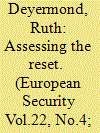

|
|
|
|
|
| Publication |
2013.
|
| Summary/Abstract |
Critics of the Obama administration's 'reset' with Russia claim that it has failed to improve bilateral relations and has conceded too much to Russia at the expense of American interests. In fact, the reset has delivered significant improvements in key areas and established the institutional basis for continued cooperation in the future, benefiting both states. Although disagreements remain on several important issues including missile defence, humanitarian intervention, and democracy, the reset has been broadly successful on its own terms, which were always limited in scope and based on a pragmatic recognition of the limits of possible cooperation. Future progress is uncertain, however - obstacles include differences of national interest; the complicating effects of relations with third party states and the impact of domestic politics. A continuation of the pragmatic approach underpinning the reset represents the best chance for stability in the US-Russia relationship.
|
|
|
|
|
|
|
|
|
|
|
|
|
|
|
|
| 2 |
ID:
125100
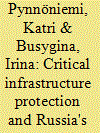

|
|
|
|
|
| Publication |
2013.
|
| Summary/Abstract |
The Russian policy on critical infrastructure protection was outlined in the early 2000s and has been consolidated in recent years as a part of the national security strategy. This policy is evolving against a background composed of an uneasy combination of factors: the degeneration of infrastructures critical for the country's economic and social development, and the de-legitimization of political institutions responsible for protecting 'population' and 'territory'. The recent major catastrophes in Russia, the notorious forest fires in 2010 in particular, have become examples of political events that offer a point of reference for the current regime's failure to uphold its promises of 'order and stability'.
|
|
|
|
|
|
|
|
|
|
|
|
|
|
|
|
| 3 |
ID:
131018
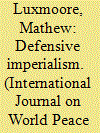

|
|
|
|
|
| Publication |
2014.
|
| Summary/Abstract |
This article examines Russia's approach to the post-Soviet space in relation to domestic stability during
I'utin's first two terms. It identi?es three dimensions of security which underpinned foreign policy during
this period-ideological, economic, and mi1itary~and demonstrates how each interacted with policies on the domestic front. Assessing Rnssia's response to Ukraine's Orange Revolution, it shows how the events of 2004 initiated a shift towards insulation from perceived external threats to political stability. A policy of "defensive imperialism" emerged whereby offensive actions abroad were aimed fundamentally at facilitating a stable external environment to politically safeguard the regime. The article concludes with a brief assessment of developments since 2008, and offers a pessimistic prognosis of the impact this trend will have on Russia's domestic stability and its international relations.
|
|
|
|
|
|
|
|
|
|
|
|
|
|
|
|
| 4 |
ID:
127749
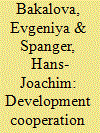

|
|
|
|
|
| Publication |
Frankfurt, Peace Research Institute frankfurt, 2013.
|
| Description |
iii, 40p.Pbk
|
| Series |
PRIF Report No.123
|
| Standard Number |
9783942532594
|
|
|
|
|
|
|
|
|
|
|
|
Copies: C:1/I:0,R:0,Q:0
Circulation
| Accession# | Call# | Current Location | Status | Policy | Location |
| 057579 | 327.47/BAK 057579 | Main | On Shelf | General | |
|
|
|
|
| 5 |
ID:
085655
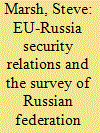

|
|
|
|
|
| Publication |
2008.
|
| Summary/Abstract |
The Kremlin's change of leadership on 7 May 2008 and growing international fears of Russia's resurgence, especially in the aftermath of the Georgian conflict, make this an interesting time to reflect upon EU-Russia security relations. This article does so by examining closely the Survey of Russian Federation Foreign Policy and, one year on from its approval, drawing upon subsequent developments as preliminary corollary or otherwise of its bearing on policy. On balance, it seems that the Kremlin's evolving perception of Russia and international relations has encouraged revised priorities and objectives and a more forceful foreign policy that not only slow progress in filling the Common Spaces, but also increase the likelihood of Russia-EU competition especially in their shared neighbourhood.
|
|
|
|
|
|
|
|
|
|
|
|
|
|
|
|
| 6 |
ID:
083916
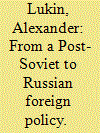

|
|
|
| 7 |
ID:
083915
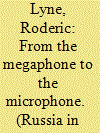

|
|
|
| 8 |
ID:
097956
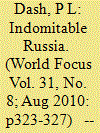

|
|
|
| 9 |
ID:
127037
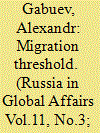

|
|
|
|
|
| Publication |
2013.
|
| Summary/Abstract |
Russia's policy in Central Asia has been determined by the logic of interaction between great powers and international prestige for two decades after the breakup of the USSR. But illegal migration, or, rather, the public sentiment around it, is becoming such a significant factor in the domestic political situation that it can make Moscow revise its priorities in relations with Central Asian countries. Changes might impact even the Eurasian Economic Union project.
|
|
|
|
|
|
|
|
|
|
|
|
|
|
|
|
| 10 |
ID:
083918
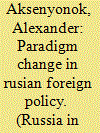

|
|
|
| 11 |
ID:
131030
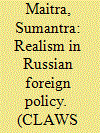

|
|
|
|
|
| Publication |
2014.
|
| Summary/Abstract |
The Crimean crisis marks a pivotal point in the rations between Russia and the West. The revolution in Ukraine, and the subsequent events that unfolded at breakneck pace, including the annexation of Crimea by Russia, throws up a lot of questions, the answers to which will have a massive impact on foreign policy and inter-state relations in the future. It also throws up some broad patterns. The crisis is a worrying return to a trend of land annexation by a great power on a pretext, a trend which was thought to be long dead Munich Conference of 2007. It brings back the debate on the concepts of "Perception and Resolve" in foreign policy. And, perhaps, most importantly, it serves as a vindication of realists over the liberals, constructivists and other paradigms of international relations, and validates the often discussed idea that state interests triumph over every other aspect.
|
|
|
|
|
|
|
|
|
|
|
|
|
|
|
|
| 12 |
ID:
084115
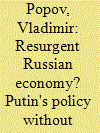

|
|
|
| 13 |
ID:
083993
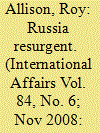

|
|
|
|
|
| Publication |
2008.
|
| Summary/Abstract |
Russia's military incursion into Georgia in August 2008 and formal recognition of South Ossetia and Abkhazia raise fundamental questions about Russian regional policy, strategic objectives and attitudes to the use of armed force. The spectacle of maneouvre warfare on the periphery of Europe could form a watershed in post-Cold War Russian relations with its neighbourhood and the wider international community. The speed and scale with which Russia's initial 'defensive' intervention to 'coerce Georgia to peace' led to a broad occupation of many Georgian regions focuses attention on the motivations behind Russian military preparations for war and the political gains Moscow expected from such a broad offensive. Russia has failed to advance a convincing legal case for its operations and its 'peace operations' discourse has been essentially rhetorical. Some Russian goals may be inferred: the creation of military protectorates in South Ossetia and Abkhazia; inducing Georgian compliance, especially to block its path towards NATO; and creating a climate of uncertainty over energy routes in the South Caucasus. Moscow's warning that it will defend its 'citizens' (nationals) at all costs broadens the scope of concerns to Russia's other neighbour states, especially Ukraine. Yet an overreaction to alarmist scenarios of a new era of coercive diplomacy may only encourage Russian insistence that its status, that of an aspirant global power, be respected. This will continue to be fuelled by internal political and psychological considerations in Russia. Careful attention will need to be given to the role Russia attributes to military power in pursuing its revisionist stance in the international system.
|
|
|
|
|
|
|
|
|
|
|
|
|
|
|
|
| 14 |
ID:
090499
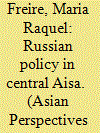

|
|
|
| 15 |
ID:
089272
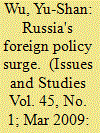

|
|
|
| 16 |
ID:
098280
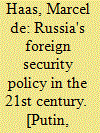

|
|
|
|
|
| Publication |
London, Routledge, 2010.
|
| Description |
xviii, 211p.
|
| Series |
Contemporary security studies
|
| Standard Number |
9780415477307, hbk
|
|
|
|
|
|
|
|
|
|
|
|
Copies: C:1/I:0,R:0,Q:0
Circulation
| Accession# | Call# | Current Location | Status | Policy | Location |
| 055177 | 355.033547/HAA 055177 | Main | On Shelf | General | |
|
|
|
|
| 17 |
ID:
125364
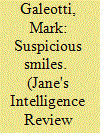

|
|
|
|
|
| Publication |
2013.
|
| Summary/Abstract |
Russian prime minister Dmitry Medvedev visited China in late October to hold high level talks and oversee a major new energy deal. Mark Galeotti reports on the countries' economic, political and security relations, which appear to be blooming.
|
|
|
|
|
|
|
|
|
|
|
|
|
|
|
|
| 18 |
ID:
135187
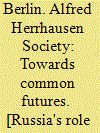

|
|
|
|
|
| Publication |
Berlin, Foresight, 2008.
|
| Description |
48p.Pbk
|
|
|
|
|
|
|
|
|
|
|
|
Copies: C:1/I:0,R:0,Q:0
Circulation
| Accession# | Call# | Current Location | Status | Policy | Location |
| 058017 | 327.47/BER 058017 | Main | On Shelf | General | |
|
|
|
|
| 19 |
ID:
048480
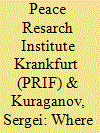

|
|
|
|
|
| Publication |
Frankfurt, Peace Research Institute frankfurt, 1994.
|
| Description |
36p.
|
| Contents |
PRIF reports no. 34
|
| Standard Number |
3928965417
|
|
|
|
|
|
|
|
|
|
|
|
Copies: C:1/I:0,R:0,Q:0
Circulation
| Accession# | Call# | Current Location | Status | Policy | Location |
| 041455 | 355.033547/KAR 041455 | Main | On Shelf | General | |
|
|
|
|
| 20 |
ID:
126467
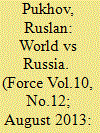

|
|
|
|
|
| Publication |
2012.
|
| Summary/Abstract |
Despite a multitude of various official doctrines and concepts, the Russian approach to strategic policy and national defence planning still remains internally inconsistent and haphazard. The Russian National Security Doctrine-2020, approved by erstwhile President Dmitry Medvedev in May 2009 (and clearly developed under the guidance of Vladimir Putin) is largely devoid of any political commitments or meaningful strategies. The situation results from the fact that Russia has yet to overcome the crisis of national identity since the break-up of the former Soviet Union. The Russian nation and the political elite have not yet reached a comfortable level of consensus regarding post-Soviet Russia's national goals, values and political orientation. That is why Russian politics is an odd mix of the old and the new; Russia wants to modernise, but it also wants to keep its old values. Part of it wants to be pro-West, but another part remains staunchly anti-West. This conflict stands in the way of clearly defining the national goals, as well as the objectives to be set before the Russian armed forces, the nature of the threats for the country, and the list of its potential adversaries. Answers to these important questions are often being given 'on the hoof', often as a knee-jerk reaction to whatever challenges, threats or problems the country happens to be facing at any given moment. This fundamental deficiency defines the current state of Russian foreign and defence policy, as well as Russian strategic planning.
|
|
|
|
|
|
|
|
|
|
|
|
|
|
|
|
|
|
|
|
|